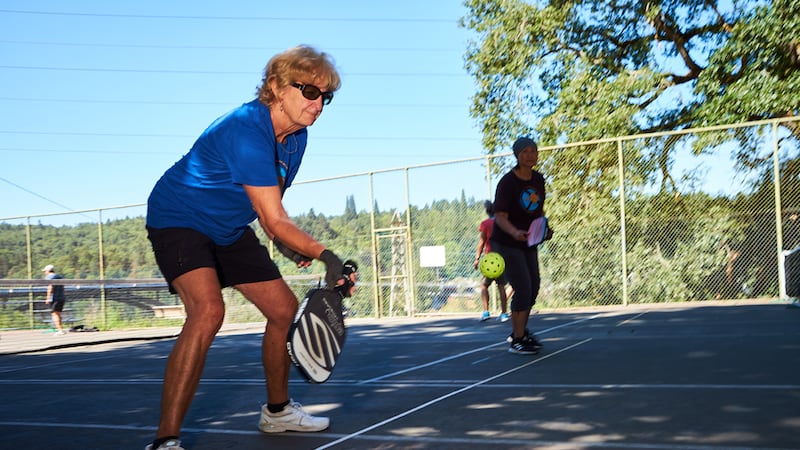The Irvington Club in Northeast Portland has closed its two outdoor pickleball courts after receiving a cease-and-desist letter from a neighbor who for years has complained about the game’s high-pitched noise.
An attorney representing Lisa Scott, a long-disgruntled neighbor whose home sits just 15 feet from Irvington’s twin pickleball courts, sent the club a cease-and-desist letter on Monday, March 25. The lawyer, Leta Gorman, demanded that the club immediately stop all pickleball play until the club finds a way to mitigate the noise.
“I am writing to demand that the Club immediately cease and desist all outdoor pickleball play until a noise mitigation plan for outdoor pickleball play has been accepted by both the Club and the Scotts and is fully implemented,” Gorman wrote. “If the Club refuses to cease pickleball play by Monday, April 8, 2024, the Scotts intend to file the enclosed Complaint.”
Gorman attached the lawsuit Scott intends to file should Irvington resume pickleball. The draft lawsuit alleges that the pickleball noise has “constructively evicted the Scotts from their home” and has caused health issues “including headaches, mental distress, depression, anxiety and increased gastrointestinal issues.” Gorman wrote that pickleball has “resulted in unreasonable and excessive noise and trespass (pickleball balls being regularly found in Plaintiffs’ yard).”
The Scotts threatened to ask a judge to force the club to halt outdoor pickleball, and to seek nuisance and punitive damages.
Scott, 66, who has lived with her husband Kevin, 88, in their Irvington home for over 25 years, tells WW that living next to the courts for the past six years has been “hell.”
“I cannot live a normal life,” Scott says. “For me, it’s hell.”
Irvington Club is a private nonprofit that relies primarily on membership fees to sustain operations. The club first set up its outdoor pickleball courts in 2018.
A spokesman for the Irvington Club, Kevin Hanzlik, said to WW in a statement that the club “disagree[s] with many of the allegations in their complaint and it remains our hope that we can reach a resolution with the Scott’s that both satisfies their concerns over the noise and retains our members ability to play pickleball.”
Hanzlik said the club has taken measures to mitigate the disturbance to the Scotts, including limiting pickleball hours, banning music on the courts, encouraging members to be quiet, and by offering to install a sound barrier “between the outdoor court and the Scott’s house.”
As the popularity of pickleball has risen, so have conflicts over the noise it produces. Such a conflict came to a head in early 2023 when the Lake Oswego City Council voted to shut down pickleball courts at a public park because of persistent neighborhood complaints.
For her part, records show Scott has complained for years to Portland officials about the high-pitched ping emanating into her house.
On multiple occasions, Scott and her neighbor, Martin Leima, have brought their grievances to the city’s Noise Review Board. In November 2022, Scott told the review board, which listens to grievances alleging violations of the city’s noise code, that her health issues had been exacerbated by the sounds of pickleball being played up to 10 hours a day, seven days a week. Scott told the board she has to leave fans on all day inside her house to drown out the noise of pickleball and can’t go outside whenever the sport is played.
Present at that meeting was Ed Raniza, a representative of the Irvington Club, who in the city’s notes from the meeting acknowledged the issue had been ongoing but that Irvington had tried to make concessions to Scott.
“He said that the club has limited the hours pickleball is played out of doors in response to the neighborhood complaints, introduced the use of quieter balls and that this is only an issue for five months a year, as pickleball is played indoors when the weather is poor,” city notes read. “He stated that they have explored using sound abatement (like a curtain on the fence) but that presented challenges with blocking the sunlight into the neighbor’s yard.”
The city’s noise code states: “Sounds not electronically amplified, created by athletic and entertainment events other than motor vehicle racing events are exempt.”
The Noise Review Board requested at the end of the November 2022 meeting that the city’s Noise Office take decibel readings of the pickleball courts and ask for the city attorney’s opinion on whether pickleball is included in the definition of “athletic event.” The City Attorney’s Office deemed that pickleball was, indeed, exempt from the Noise Code.
By March 2023, the issue remained unsettled.
One Noise Review Board member noted that this scenario was a “particularly complex issue” because Irvington sits on private, not public, property.
At an August 2023 meeting of the Noise Review Board, a manager with the Bureau of Development Services said that the city was undertaking a review and edit of its Noise Code to “enhance community expectations, clearly articulate requirements, bolster the Noise Program’s ability to enforce the code, and establish reasonable standards for safeguarding community health and needs.” That review remains ongoing.
Leima, the Scotts’ neighbor, says he’s taken decibel readings in the Scotts’ backyard that reach 80 decibels. According to the city’s Noise Code, noise must not exceed 55 decibels in residential areas.
Scott, who says she’s collected two shopping bags full of pickleball balls that have landed in her backyard, says the city left her no choice but to involve a lawyer in the matter.
“Something has to get resolved.”
